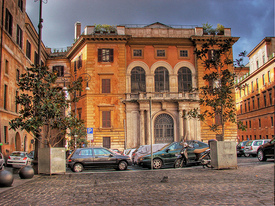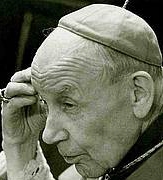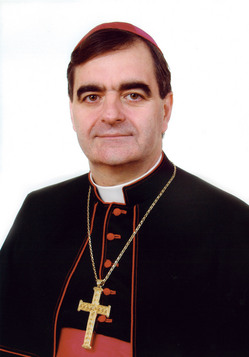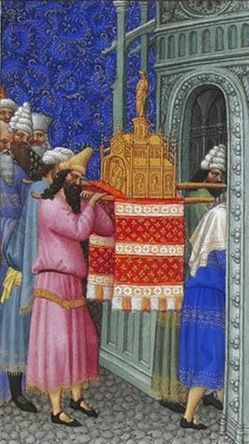The Pope released his post-synodal Apostolic Exhortation, Verbum Domini, following the 2008 Synod of Bishops on the Word of God. It’s available in eight languages in at least 200 pages.
Verbum Domini – English
Verbum Domini – Italiano
Verbum Domini – Español
The press conference:
At midday today
in the Holy See Press Office, the presentation took place of the Post-Synodal
Apostolic Exhortation “Verbum Domini” of Benedict XVI, on the Word of
God in the life and mission of the Church.
Today’s press conference was
presented by Cardinal Marc Ouellet P.S.S., prefect of the Congregation for
Bishops; Archbishop Gianfranco Ravasi, president of the Pontifical Council for
Culture, and Archbishop Nikola Eterovic and Msgr. Fortunato Frizza,
respectively secretary general and under secretary of the Synod of Bishops.
The
Apostolic Exhortation, which is dated 30 September, Memorial of St. Jerome, is
the fruit of the Twelfth Ordinary General Assembly of the Synod of Bishops,
which was held in Rome from 5 to 26 October 2008. The document, which has been
published in Latin, Italian, English, French, Spanish, German, Portuguese and
Polish, is made up of an introduction, three parts and a conclusion.
Achbishop
Eterovic explained how in part one, entitled “Verbum Dei”, the Pope
highlights both “the fundamental role of God the Father, source and origin
of the Word”, and “the Trinitarian dimension of revelation”.
Chapter one – “The God Who Speaks” – underscores “God’s will to
open and maintain a dialogue with man, in which God takes the initiative and
reveals Himself in various ways”. It also dwells on “the
Christological aspect of the Word, while at the same time underlining the
pneumatological dimension”. This section of the document also focuses on
the relationship between the Eucharist and Tradition, and on the theme of the
inspiration and truth of the Bible.
“Our Response to the God Who
Speaks” is the title of chapter two of part one. “Man is called to
enter into the Alliance with his God, Who listens to him and responds to his
questions. To God Who speaks, man responds with the faith. The most suitable
prayer is that made using the words which were revealed by God and are
conserved and written in the Bible”, said Archbishop Eterovic.
Chapter
three has as its title “The Interpretation of Sacred Scripture in the
Church”. The secretary general of the Synod of Bishops explained how
“Sacred Scripture should be, as the Dogmatic Constitution ‘Dei Verbum’
says, ‘the soul of sacred theology’. … The biblical hermeneutics of Vatican
Council II must be rediscovered, also in order to avoid a certain dualism
evident in secularised interpretations which could give rise to a
fundamentalist and spiritualist interpretation of Holy Scripture. Correct
interpretation requires complementarity in a literal and spiritual sense, a
harmony between faith and reason”. This chapter also examines relations
between Christians and Jews, noting that they enjoy “a very special
relationship … because they share a large part of the Scriptures”.
Part
two of the document is entitled “Verbum in Ecclesia”. Chapter one –
“The Word of God and the Church” – underlines how it is thanks to the
Word of God and the effect of the Sacraments “that Jesus remains
contemporary to mankind in the life of the Church”, said the archbishop.
“The
Liturgy, Privileged Setting for the Word of God” is the title of chapter
two, in which the focus turns to “the vital link between Sacred Scripture
and the Sacraments, especially the Eucharist”. The importance of the
Lectionary is mentioned, as is that of the proclamation of the Word and the
ministry of reader, with particular emphasis being laid on the preparation of
the homily, a theme of great importance in this Post-Synodal Apostolic
Exhortation.
Chapter three of part two concerns “The Word of God in the
Life of the Church” and highlights “the importance of biblical inspiration
for pastoral activity, the biblical dimension of catechesis, the biblical
formation of Christians, the use of Sacred Scripture in great ecclesial
gahterings, and the Word of God in relation to vocations”. Attention is
also given to “lectio divina and Marian prayer”, said the
archbishop.
Part three of the document published today has as its title
“Verbum Mundo”. It draws attention to “the duty of Christians to
announce the Word of God in the world in which they live and work”.
Chapter one – “The Church’s Mission to Proclaim the Word of God to the
World” – explains how the Church “is oriented towards the
announcement ‘ad gentes’, to people who do not yet know the Word, … but also
to those who have already been baptised … but need new evangelisation in
order to rediscover the Word of God”.
“The Word of God and Commitment
to the World” is the title of chapter two, which recalls how
“Christians are called to serve the Word of God in their most needy
brothers and sisters and, hence, to commit themselves in society for
reconciliation, justice and peace among peoples”.
Chapter three of part
three is dedicated to “The Word of God and Culture”. It expresses the
hope “that the Bible may become better known in schools and universities
and that better use may be made of the social communications media, exploiting
all the modern possibilities of technology. The theme of the inculturation of
Sacred Scripture is also linked to the translation and diffusion of the Bible,
which must be increased”, said Archbishop Eterovic.
“The Word of God
and Inter-religious Dialogue” is the title of chapter four. “Having
established the value and topicality of inter-religious dialogue, ‘Verbum
Domini’ … supplies some important guidelines concerning dialogue between
Christians and Muslims, and with members of other non-Christian religions,
within the framework of a religious liberty which involves not only the freedom
to profess one’s faith in private and in public, but also freedom of
conscience; in other words, of choosing one’s religion”.
In the
conclusion, Archbishop Eterovic concluded his explanations, the Holy Father
reiterates his exhortation to all Christians “to become increasingly
familiar with Sacred Scripture”.






